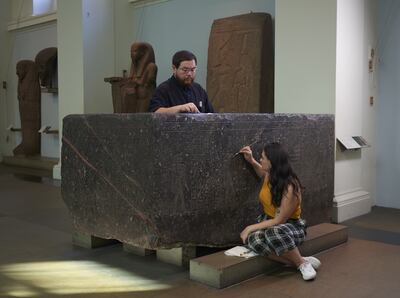On July 15, 1799, during the digging of a trench by the French engineer Pierre Francois Xavier Bouchard to build a new fort in Rashid (Rosetta), a city in Egypt’s north, the occupying French forces found a granodiorite block.
He soon understood its importance, even though, at first glance, it was simply a reused ancient stone, a customary practice for the medieval construction of churches, mosques and secular buildings in Egypt.
It was, in fact, the Rosetta Stone. The three languages carved into it allowed researchers to read the language of the ancient Egyptians. It was easily one of the most seismic moments in the history of History.

The French occupation of the country at the time of the discovery was led by Napoleon Bonaparte, who thought himself the modern version of Alexander the Great, the conqueror of the “Orient” some 2,000 years before. With such an imperialistic endeavour, Napoleon did his best to not only win military success in the country. He also brought French researchers to, as they would have put it, “discover" ancient Egypt.
Napoleon lost the campaign to the combined army of British and Ottoman forces in March 1801. But, today, that does not stop the ongoing effort of some in France to present the era as a cultural victory, even if the military one failed.
However, the nation at the heart of the story of the Rosetta Stone in modern times is not France, but Britain. The British Museum, where it ended up, claims their acquisition is legal. However, even in the international law of that time, this is highly contested.
What the curators of the British Museum do not appreciate is the highly ambiguous state of Article 16 of the Capitulation of Alexandria, the text that ended France’s power in Egypt. It stipulated that the French must cede antiquities they discovered to the “Combined Army” comprising the victorious British and Ottoman forces. The Rosetta Stone was one of these items, alongside 16 other objects snatched from different Egyptian cities as a spoil of war.
To date, no records in the archives of Cairo, Istanbul or London attest that the Ottomans, an empire that has long since fallen, ever gave up their share of the claim over the 17 objects to the British. Furthermore, the Combined Army was dissolved right after the war, which left the ownership of the 17 objects highly legally contested in terms of the international customary law of the early 19th century.
Crucially, Egyptians had no say in the process. It is a moral betrayal. The western obsession with ancient Egyptian objects has robbed the country of its heritage. It is known by some archaeologists as the “Rape of the Nile”.
European powers then entered a warped period of competing over who had the bigger and more powerful collections and, in a sense, who vanquished the most over colonial victims.

The inherent power of these objects, and of having them, added to an identity of these countries that glorifies a colonial past, one that denies Egyptians a way to view them as a part of their own culture. The vast museums that emerged in colonial capitals are symbols of this twisted reality. Contrasting the global East with the global West also adds to it. These museums have evolved into something of a “Heterotopia”, a concept that French philosopher Michel Foucault used to describe a process of making and things as “other”.
Such western monopoly and regulation of the cultural heritage created fragmented histories to satisfy western pride. These museums and their affiliated scholars not only took away the objects, but also wrote modern Egyptians out of the history of their own heritage. Modern Egyptians were just a nuisance to their excavations that set out to find the gold, mummies, and manuscripts.
The British Museum continues to play its role in such cultural violence by showing the spoils of imperialist and colonialist wars. Retaining spoils of war among the wider museum collections legitimates violence and the use of force to acquire objects. This directly affects the illicit antiquities trade market today. Indeed, collectors and museum curators still buy blood antiquities not necessarily because of their cultural value, but to satisfy this power-based addiction.

And when these institutions adopt a universalist approach, defending their position by saying that they keep objects accessible in one location to all from around the world, they ignore how difficult it is for so many people to get European visas.
Because knowledge is more valuable than gold, repatriation should not only be for the valuable objects that have been taken from Egypt, but also for excavation archives and manuscripts. Only then will full agency finally be given back to Egyptians over their heritage.
The people of the city of Rashid await the Rosetta Stone with a corresponding plan for sustainable economic reforms for the city, which is so heavily threatened by climate change. They also have plans for reparations, to make up for 200 years during which the area has been missing artefacts that would otherwise contribute to the historical diversity of such a beautiful Ottoman city. Other locations in Egypt expect the other missing 16 objects, to fit lost puzzles of the Egyptian estranged past, and to create meanings for the future through such a rich heritage.


